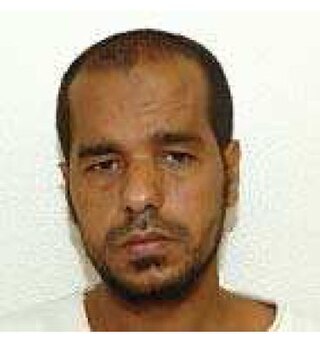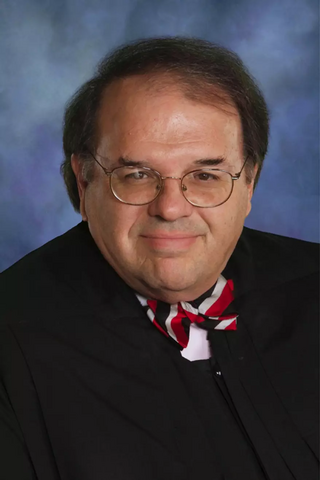
Ibrahim Ahmed Mahmoud al Qosi is a Sudanese militant and paymaster for al-Qaeda. Qosi was held from January 2002 in extrajudicial detention in the United States Guantanamo Bay detainment camps, in Cuba. His Guantanamo Internment Serial Number is 54.

Mustafa Ahmed Adam al-Hawsawi is a Saudi Arabian citizen. He is alleged to have acted as a key financial facilitator for the September 11 attacks in the United States.
Enemy combatant is a term for a person who, either lawfully or unlawfully, engages in hostilities for the other side in an armed conflict, used by the U.S. government and media during the War on Terror. Usually enemy combatants are members of the armed forces of the state with which another state is at war. In the case of a civil war or an insurrection "state" may be replaced by the more general term "party to the conflict".
Hamdan v. Rumsfeld, 548 U.S. 557 (2006), is a United States Supreme Court case in which the Court held that military commissions set up by the Bush administration to try detainees at Guantanamo Bay violated both the Uniform Code of Military Justice (UCMJ) and the Geneva Conventions ratified by the U.S.

Salim Ahmed Salim Hamdan is a Yemeni man, captured during the invasion of Afghanistan, declared by the United States government to be an illegal enemy combatant and held as a detainee at Guantanamo Bay from 2002 to November 2008. He admits to being Osama bin Laden's personal driver and said he needed the money.

Arthur Raymond Randolph is an American lawyer and jurist serving as a senior United States circuit judge of the United States Court of Appeals for the District of Columbia Circuit. He was appointed to the Court in 1990 and assumed senior status on November 1, 2008.
Peter E. Brownback III is a retired military officer and lawyer. He was appointed in 2004 by general John D. Altenburg as a Presiding Officer on the Guantanamo military commissions. The Washington Post reported: "...that Brownback and Altenburg have known each other since 1977, that Brownback's wife worked for Altenburg, and that Altenburg hosted Brownback's retirement party in 1999."

Richard J. Leon is an American jurist who serves as a senior United States district judge of the United States District Court for the District of Columbia.

Moath Hamza Ahmed al-Alwi is a citizen of Yemen, held in extrajudicial detention in the United States Guantanamo Bay detainment camps, in Cuba. His detainee ID number is 28. Guantanamo analysts estimated he was born in 1977, in Al Hudaydah, Yemen.

Ibrahim Othman Ibrahim Idris was a citizen of Sudan, formerly held in extrajudicial detention in the United States' Guantanamo Bay detainment camps, in Cuba. His detainee ID number was 036.

Ali Hamza Ahmad Suliman al-Bahlul is a Yemeni citizen who has been held as an enemy combatant since 2002 in the United States Guantanamo Bay detention camp. He boycotted the Guantanamo Military Commissions, arguing that there was no legal basis for the military tribunals to judge him.
Boumediene v. Bush, 553 U.S. 723 (2008), was a writ of habeas corpus petition made in a civilian court of the United States on behalf of Lakhdar Boumediene, a naturalized citizen of Bosnia and Herzegovina, held in military detention by the United States at the Guantanamo Bay detention camps in Cuba. The case underscored the essential role of habeas corpus as a safeguard against government overreach, ensuring that individuals cannot be detained indefinitely without the opportunity to challenge the legality of their detention. Guantánamo Bay is not formally part of the United States, and under the terms of the 1903 lease between the United States and Cuba, Cuba retained ultimate sovereignty over the territory, while the United States exercises complete jurisdiction and control. The case was consolidated with habeas petition Al Odah v. United States. It challenged the legality of Boumediene's detention at the United States Naval Station military base in Guantanamo Bay, Cuba as well as the constitutionality of the Military Commissions Act of 2006. Oral arguments on the combined cases were heard by the Supreme Court on December 5, 2007.
Parhat v. Gates, 532 F.3d 834, was a case involving a petition for review under the Detainee Treatment Act of 2005 filed on behalf of Huzaifa Parhat, and sixteen other Uyghur detainees held in extrajudicial detention in the United States Guantanamo Bay detention camps, in Cuba.
Bismullah v. Gates is a writ of habeas corpus appeal in the United States Justice System, on behalf of Bismullah —an Afghan detainee held by the United States in the Guantanamo Bay detention camps, in Cuba. It was one of over 200 habeas corpus petitions filed on behalf of detainees held in the Guantanamo Bay detention camp in Cuba.
Kiyemba v. Bush (Civil Action No. 05-cv-01509) is a petition for habeas corpus filed on behalf of Jamal Kiyemba, a Ugandan citizen formerly held in extrajudicial detention in the United States' Guantanamo Bay detention camps, in Cuba. Mr. Kiyemba is the next friend of each of the nine Uighur petitioners, Abdusabur, Abdusamad, Abdunasir, Hammad, Hudhaifa, Jalaal, Khalid, Saabir, and Saadiq, who seek the writ of habeas corpus through the petition
Guantanamo Bay detainees have been allowed to initiate appeals in Washington, D.C., courts since the passage of the Detainee Treatment Act of 2005 (DTA) closed off the right of Guantanamo captives to submit new petitions of habeas corpus. It substituted a right to a limited appeal to Federal Courts of appeal in Washington, D.C. The Act allowed detainees to challenge whether their Combatant Status Review Tribunals had correctly followed the rules laid out by the Department of Defense.
El Mashad v. Bush is a writ of habeas corpus filed on behalf of several Guantanamo detainees, including Sherif el-Mashad, Adel Fattouh Aly Ahmed Algazzar and Alladeen.
Al Joudi v. Bush (Civil Action No. 05-cv-301) is a United States District Court for the District of Columbia case. On February 9, 2005, a Petition for a Writ of Habeas Corpus was filed on behalf of four Guantanamo detainees: Majid Abdulla Al Joudi, Yousif Mohammad Mubarak Al-Shehri, Abdulla Mohammad Al Ghanmi and Abdul-Hakim Abdul-Rahman Al-Moosa, before US District Court Judge Gladys Kessler. It was one of over 200 habeas corpus petitions filed in the US District Court on behalf of detainees held in the Guantanamo Bay detention camp in Cuba, seeking release. On March 26, 2008, Judge Gladys Kessler dismissed the petition as moot.

Al-Asadi v. Bush, No. 1:05-cv-02197, is a writ of habeas corpus filed on behalf of Guantanamo detainee Mohammed Ahmed Ali Al Asadi before US District Court Judge Henry H. Kennedy. It was one of over 200 habeas corpus petitions filed on behalf of detainees held in the Guantanamo Bay detention camp in Cuba.
Sufyian Ibn Muhammad Barhoumi is an Algerian man who was held in extrajudicial detention in the United States Guantanamo Bay detention camps, in Cuba. The Department of Defense reports that he was born on July 28, 1973, in Algiers, Algeria.









